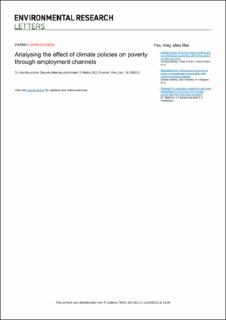| dc.contributor.author | Malerba, Daniele | |
| dc.contributor.author | Wiebe, Kirsten Svenja | |
| dc.date.accessioned | 2022-10-11T12:44:55Z | |
| dc.date.available | 2022-10-11T12:44:55Z | |
| dc.date.created | 2021-02-15T12:01:14Z | |
| dc.date.issued | 2020 | |
| dc.identifier.citation | Environmental Research Letters, 2020, 16 (3), 1-10 | en_US |
| dc.identifier.issn | 1748-9326 | |
| dc.identifier.uri | https://hdl.handle.net/11250/3025388 | |
| dc.description.abstract | The recently proposed Green Deals and "building back better" plans have affirmed the importance to make green transitions inclusive. This is particularly related to the labour market, which may witness significant changes. Empirically, this issue has until now received limited attention. The links between poverty and climate change are explored mainly through the lenses of climate change adaptation, or via the effects of rising energy prices on the purchasing power of poor households. We aim to address this gap by using results from a simulation of the global energy transition based on the IEA's Energy Technology Perspectives required to meet the 2-degree target, and compare this to the 6-degree baseline scenario. The simulation with a multi-regional input-output model finds that, overall, this transition results in a small net job increase of 0.3% globally, with cross-country heterogeneity. We complement this macro-level analysis with cross-country household data to draw implications of the effects on poverty through labour market outcomes. The few job losses will be concentrated in specific industries (manufacturing, electricity and construction), while new jobs will be created in industries that currently witness relatively in-work poverty rates, such as construction. We show that high in-work poverty in the industries of interest, and especially in middle-income countries, is often associated with low skills and an insufficient reach of social protection mechanisms. We conclude that green transitions must ensure that the jobs created are indeed decent including fair wages, adequate working conditions, sufficient social protection measures, and accessible to the vulnerable and poorest households. | en_US |
| dc.language.iso | eng | en_US |
| dc.publisher | IOP Publishing | en_US |
| dc.rights | Navngivelse 4.0 Internasjonal | * |
| dc.rights.uri | http://creativecommons.org/licenses/by/4.0/deed.no | * |
| dc.title | Analysing the effect of climate policies on poverty through employment channels | en_US |
| dc.type | Peer reviewed | en_US |
| dc.type | Journal article | en_US |
| dc.description.version | publishedVersion | en_US |
| dc.rights.holder | © 2021 The Author(s). Published by IOP Publishing Ltd | en_US |
| dc.source.pagenumber | 10 | en_US |
| dc.source.volume | 16 | en_US |
| dc.source.journal | Environmental Research Letters | en_US |
| dc.source.issue | 3 | en_US |
| dc.identifier.doi | 10.1088/1748-9326/abd3d3 | |
| dc.identifier.cristin | 1889824 | |
| cristin.ispublished | true | |
| cristin.fulltext | postprint | |
| cristin.qualitycode | 2 | |

